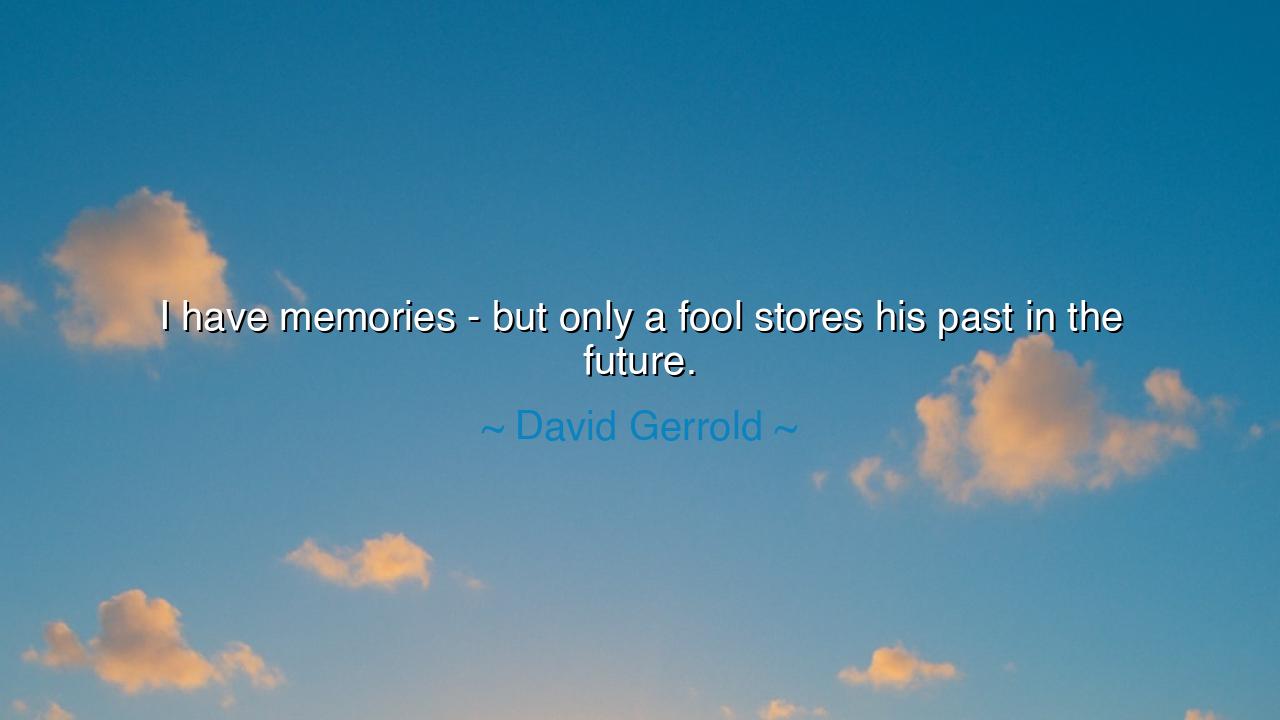
I have memories - but only a fool stores his past in the future.






In the teachings of the ancients, there was always a deep understanding that the past, though rich in memories and lessons, is not a burden to carry into the future. The great philosophers spoke of the importance of living fully in the present and facing the future with open eyes, free from the weight of the past. David Gerrold’s words, “I have memories - but only a fool stores his past in the future,” carry this same wisdom: while memories are valuable, the future is a new landscape, one that requires us to move forward and create rather than cling to what has already been.
The ancients understood that memory can be both a gift and a trap. Consider the example of Homer, the blind poet of ancient Greece, whose epics, the Iliad and Odyssey, captured the heroism and sorrow of the past. Yet, Homer’s heroes—whether it was the fierce Achilles or the wise Odysseus—were not trapped by their pasts. They learned from their experiences, but they also moved forward, knowing that the future held new challenges, new triumphs, and new battles. Gerrold’s quote serves as a reminder that we must not be anchored by past triumphs or regrets, but instead step boldly into the future, armed with the lessons of the past but not shackled by them.
The story of King Saul, the first monarch of Israel, provides a striking example of the dangers of living too much in the past. Though he began with great promise, his reign faltered as he increasingly became obsessed with the past—the memory of his early victories, the fears of past failures, and his jealousy of the rising young warrior David. His inability to let go of his past and embrace the future led to his eventual downfall. In contrast, David, though constantly haunted by the memory of his struggles, was able to move forward and trust in the future, leading his people to greatness. Saul’s fate is a cautionary tale, reminding us that holding too tightly to the past can prevent us from embracing the future.
The ancient philosophers also recognized the danger of living in the past. Epictetus, the Stoic philosopher, taught that a person should not allow external circumstances or past events to dictate their present happiness. For him, the key to peace of mind was to focus on what was within one’s control and not dwell on things that had already happened. In his teachings, he stressed that only by focusing on the present and embracing the future could one achieve true freedom. Gerrold’s words align with this ancient wisdom—memories are useful, but they should not be stored in the future as burdens. They should instead be used to guide and inform our present choices, while we move forward with hope and action.
Similarly, the Buddha spoke of the importance of detachment from the past, especially from the desire to relive or cling to past experiences. In his teachings, he warned against the suffering caused by attachment—whether to pleasure, pain, or memory—and urged his followers to focus on the present moment, for it is only in the present that one can truly find peace. The Buddhist practice of mindfulness emphasizes the need to release the past, to let go of regrets and attachments, and to live fully in the now, allowing the future to unfold with the clarity that only the present moment can offer. Gerrold’s quote echoes this teaching, reminding us that to store our past in the future is to create unnecessary suffering and miss the opportunity for true growth.
The lesson here is clear: don’t live in the shadow of your past. Memories are valuable, but they should not define us or dictate our future. The past has already happened, and while it offers lessons and wisdom, it is the future that calls us to act, to create, and to move forward. Like the ancients, we must learn from our experiences without becoming trapped by them, for the future holds infinite possibilities, and it is only by embracing it that we can fully live.
In your own life, think about the memories and experiences that you may be holding onto too tightly. Are there past successes or failures that are preventing you from moving forward? Let them go. Use the wisdom from the past, but don’t carry its weight into the future. Live fully in the present, embracing what lies ahead with hope, action, and vision. Just as the ancients did, focus on what you can control, and know that the future is a canvas waiting for you to paint your own story. Release the past—for it is in embracing the future that we truly find freedom and growth.






AAdministratorAdministrator
Welcome, honored guests. Please leave a comment, we will respond soon